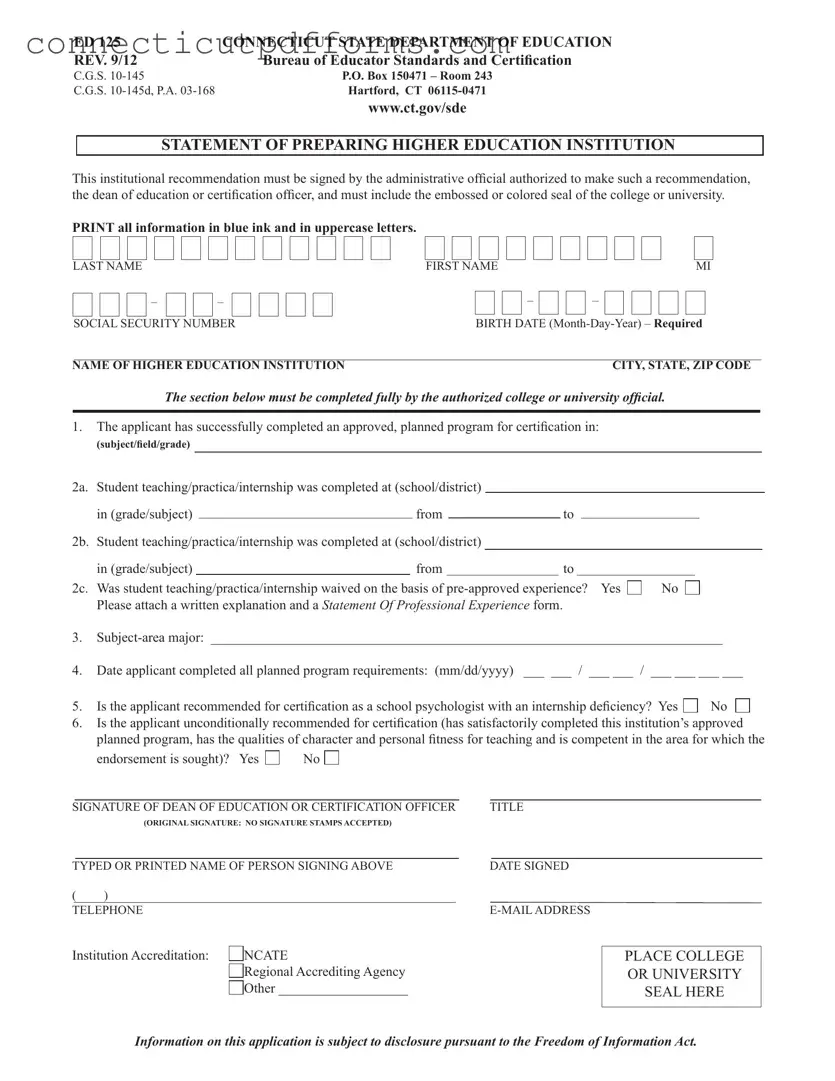The ED 126 form is similar to the ED 125 form in that it serves as an institutional recommendation for educators seeking certification. Like the ED 125, the ED 126 requires the signature of an authorized official from the higher education institution, such as a dean or certification officer. Both forms necessitate the inclusion of the institution's seal, ensuring authenticity. The ED 126 also collects information about the applicant's educational background and teaching experience, emphasizing the completion of an approved program. This form is essential for demonstrating that the candidate has met the necessary qualifications for certification.
For those in need of a structured approach to creating documentation related to mobile home transactions, resources such as the Templates and Guide prove invaluable for ensuring compliance and clarity in these legal processes.
The ED 127 form is another document that parallels the ED 125. This form is used for applicants seeking a different type of educator certification, often in specialized fields. Similar to the ED 125, the ED 127 requires verification of the candidate's educational achievements and teaching experiences. It also mandates the signature of an authorized institutional representative and the institution’s seal. Both forms aim to provide a formal recommendation that supports the applicant's qualifications for certification, reinforcing the importance of institutional endorsement in the certification process.
The ED 128 form is comparable to the ED 125 as it pertains to the certification of school administrators. This form requires the same level of institutional endorsement, including signatures and seals. The ED 128 collects information about the candidate's administrative training and experience, paralleling the requirements of the ED 125 for teaching candidates. Both documents highlight the need for a structured program and successful completion of necessary internships or practica, ensuring that all applicants meet established standards for their respective roles in education.
The ED 129 form serves a similar purpose to the ED 125 but is focused on applicants seeking certification as school counselors. Like the ED 125, it requires the endorsement of an authorized official from the educational institution. The ED 129 collects details about the applicant’s educational background, including specific coursework and internship experiences. Both forms emphasize the importance of institutional support and verification in the certification process, ensuring that candidates are well-prepared for their roles in supporting students.
The ED 130 form is another document akin to the ED 125, designed for individuals pursuing certification as special education teachers. This form requires institutional endorsement and collects information about the candidate's specialized training and field experiences. Similar to the ED 125, the ED 130 mandates the signature of an authorized official and the institution’s seal. Both forms are critical in validating the qualifications of applicants, ensuring they have completed the necessary programs and are fit for certification in their respective fields.
The ED 131 form is comparable to the ED 125 in that it is used for applicants seeking certification as occupational therapists in educational settings. It requires the same institutional endorsement and collects similar information regarding educational qualifications and practical experiences. Both forms ensure that candidates have completed an approved program and have the necessary skills for their roles. The emphasis on institutional verification in both documents reinforces the credibility of the certification process.
The ED 132 form is similar to the ED 125 as it pertains to applicants seeking certification in physical education. This form also requires an institutional recommendation, including the signature of an authorized official and the institution's seal. Like the ED 125, the ED 132 collects detailed information about the applicant's educational background and practical experiences. Both forms serve to validate the qualifications of candidates, ensuring they meet the standards required for certification in their respective teaching areas.




 Other ___________________
Other ___________________